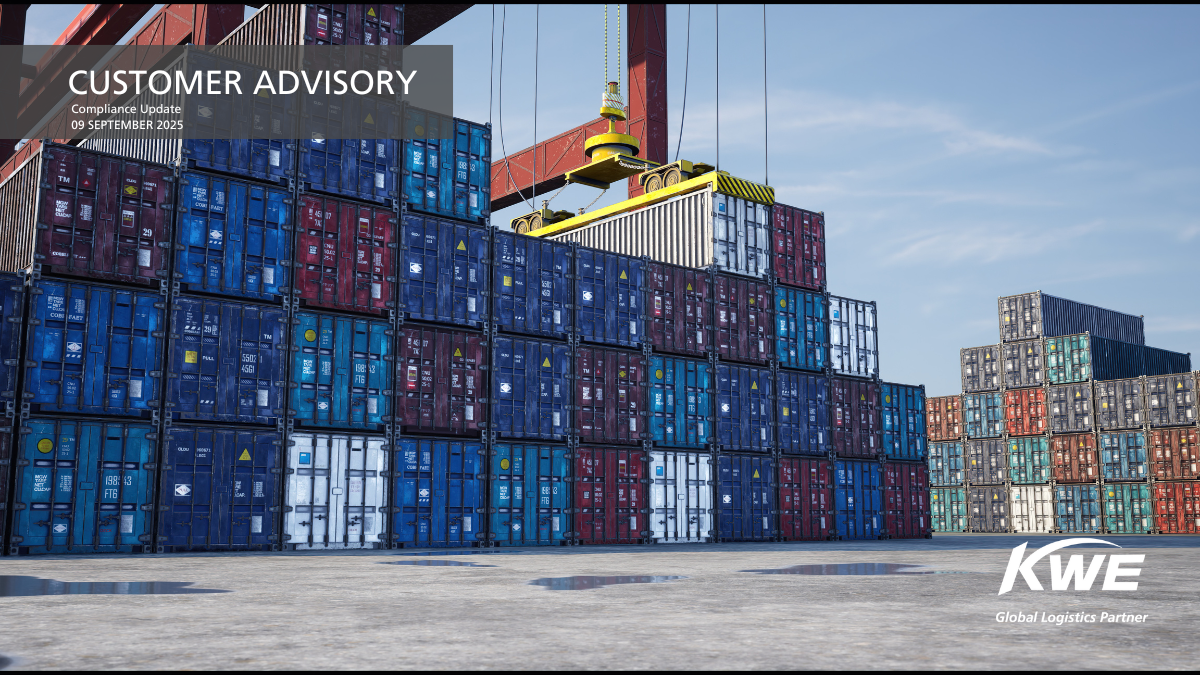Quote
Customer Advisory: Compliance Update

- Reciprocal Tariffs Modified - Refer to Cargo Systems Messaging Service (CSMS) #66151866 - UPDATE – Products Exempted from Reciprocal Tariffs. Importers should report the secondary classification under subheading 9903.01.32 for products properly classified in the heading and subheadings of the Harmonized Tariff Schedule of the United States (HTSUS) that are identified in Annex II to declare the exemption from the reciprocal tariff provided in subheading 9903.01.25, or in subheadings 9903.02.02 – 9903.02.71. For any entries that were pre-filed with subheading 9903.01.32 and that are entered for consumption or withdrawn from warehouse for consumption on or after September 8, 2025, that include products added to or removed from Annex II, importers should take action as necessary to correct entries to reflect the correct reciprocal tariff applicability as soon as possible, but no later than ten days after the cargo’s release from U.S. Customs and Border Protection (CBP) custody.
- Executive Order Issued on September 4, 2025, pertaining to imports from Japan, setting a baseline 15% ad valorem duty on nearly all imported products of Japan. Separate sector-specific treatment for automobiles and automobile parts; aerospace products; generic pharmaceuticals; and natural resources that are not naturally available or produced in the U.S. were set. Pursuant to this retroactive provision, CBP has advised the trade community not to file a Post Summary Correction or Protest until instructions are issued on how those requests for refunds should be submitted. CBP will provide additional guidance to the trade community through CSMS messages as appropriate, per Interim Guidance issued in CSMS #66146676.
- Further to the Court of Appeals for the Federal Circuit (CAFC) Ruling on August 29, 2025, that the International Emergency Economic Powers Act (IEEPA) did not grant the President unlimited authority to impose or regulate tariffs, for now, CBP is likely to continue collecting the IEEPA tariffs until a final decision is rendered. Meanwhile, it remains unclear if or when refunds may be issued, and whether they will be automatic. In the meantime, as already advised earlier, importers should:
- Monitor liquidation dates for any entries on which IEEPA tariffs were paid.
- File protests promptly for those entries to preserve refund rights if the ruling stands.
- Note that Post Summary Corrections are not yet available for these entries due to Automated Commercial Environment (ACE) system constraints.
Note the below timelines as a point of reference:
- First affected tariffs were imposed on February 4, 2025.
- Liquidation is expected around mid-December 2025.
- Protest deadline falls around mid-June 2026.
- If refunds are ultimately permitted after the protest window has ended on your entry, only those who have filed timely protests will be eligible. Once the protest window closes, it is unlikely that retroactive refunds will be granted.
- We encourage all affected importers to review their impacted entries carefully and consult with us at customs_compliance_group@kwe.com to ensure timely action.
- We will continue to monitor developments and share updates as they become available.
- Department of Homeland Security (DHS) Terminates 2021 Designation of Venezuela for Temporary Protected Status (TPS)
The 2021 TPS designation for Venezuela will terminate at 11:59 p.m. on November 7, 2025, 60 days after publication of this Federal Register - BIS Closes Export Controls Loophole for Foreign-owned Semiconductor Fabrication Plants – On August 29, 2025, the Department of Commerce’s Bureau of Industry and Security (BIS) closed a loophole known as the Validated End User program. Now these companies will need to obtain licenses to export their technology, putting them on par with their competitors.
Informational document brought to you by KWE-USA Corporate Compliance